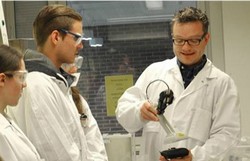New tools for training and quality assurance of teaching in nuclear chemistry
Skills in nuclear chemistry are important for maintaining Europe's nuclear operations. Yet, recent research highlighted that many countries are training too few specialists to meet the needs of their nuclear industries. Even if Europe decides to phase out its nuclear energy programme, specialists with nuclear chemistry skills would remain essential for decommissioning nuclear installations. There is also demand for these skills in other sectors. To address this gap, the EU-funded CINCH-II(opens in new window) (Cooperation in education and training in nuclear chemistry) initiative developed training resources and quality label for university teaching programmes in nuclear chemistry. This work builds on the efforts of the CINCH-I initiative. The initiative's main output was the implementation of a quality label for the European master's degrees in nuclear and radiochemistry and a system for its awarding. This included establishing minimum requirements and evaluation criteria for the degree. Researchers involved in the initiative also assessed what skills the nuclear industry needs and developed programmes and training materials that address them. The initiative piloted four of the courses that were developed. Researchers also set up a database of nuclear and radiochemistry study materials, called NucWik(opens in new window). The site has been updated continuously with teaching material, including exercises and computer simulation software. One of the most recent uploads to the database was an open-access textbook created by the CINCH-II initiative. All the key European nuclear countries, academia and national nuclear laboratories are represented in the initiative, which has improved collaboration among these entities. A European NRC Network(opens in new window) was founded as a new Euratom Fission Training Scheme (EFTS) and as a major step towards the sustainability of the results. The outputs from this initiative will benefit students, teachers, nuclear industries and the research community.



